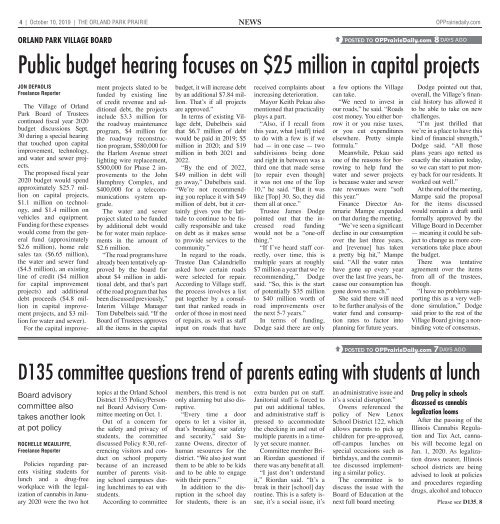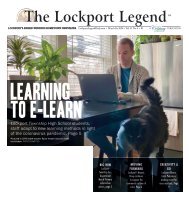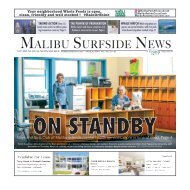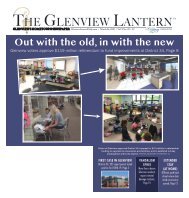OP_101019
OP_101019
OP_101019
Create successful ePaper yourself
Turn your PDF publications into a flip-book with our unique Google optimized e-Paper software.
4 | October 10, 2019 | the orland Park Prairie news<br />
<strong>OP</strong>Prairiedaily.com<br />
Orland Park Village Board<br />
Public budget hearing focuses on $25 million in capital projects<br />
Jon DePaolis<br />
Freelance Reporter<br />
The Village of Orland<br />
Park Board of Trustees<br />
continued fiscal year 2020<br />
budget discussions Sept.<br />
30 during a special hearing<br />
that touched upon capital<br />
improvement, technology,<br />
and water and sewer projects.<br />
The proposed fiscal year<br />
2020 budget would spend<br />
approximately $25.7 million<br />
on capital projects,<br />
$1.1 million on technology,<br />
and $1.4 million on<br />
vehicles and equipment.<br />
Funding for these expenses<br />
would come from the general<br />
fund (approximately<br />
$2.6 million), home rule<br />
sales tax ($6.65 million),<br />
the water and sewer fund<br />
($4.5 million), an existing<br />
line of credit ($4 million<br />
for capital improvement<br />
projects) and additional<br />
debt proceeds ($4.8 million<br />
in capital improvement<br />
projects, and $3 million<br />
for water and sewer).<br />
For the capital improvement<br />
projects slated to be<br />
funded by existing line<br />
of credit revenue and additional<br />
debt, the projects<br />
include $3.3 million for<br />
the roadway maintenance<br />
program, $4 million for<br />
the roadway reconstruction<br />
program, $580,000 for<br />
the Harlem Avenue street<br />
lighting wire replacement,<br />
$500,000 for Phase 2 improvements<br />
to the John<br />
Humphrey Complex, and<br />
$400,000 for a telecommunications<br />
system upgrade.<br />
The water and sewer<br />
project slated to be funded<br />
by additional debt would<br />
be for water main replacements<br />
in the amount of<br />
$2.6 million.<br />
“The road programs have<br />
already been tentatively approved<br />
by the board for<br />
about $4 million in additional<br />
debt, and that’s part<br />
of the road program that has<br />
been discussed previously,”<br />
Interim Village Manager<br />
Tom Dubelbeis said. “If the<br />
Board of Trustees approves<br />
all the items in the capital<br />
budget, it will increase debt<br />
by an additional $7.84 million.<br />
That’s if all projects<br />
are approved.”<br />
In terms of existing Village<br />
debt, Dubelbeis said<br />
that $6.7 million of debt<br />
would be paid in 2019; $5<br />
million in 2020; and $19<br />
million in both 2021 and<br />
2022.<br />
“By the end of 2022,<br />
$49 million in debt will<br />
go away,” Dubelbeis said.<br />
“We’re not recommending<br />
you replace it with $49<br />
million of debt, but it certainly<br />
gives you the latitude<br />
to continue to be fiscally<br />
responsible and take<br />
on debt as it makes sense<br />
to provide services to the<br />
community.”<br />
In regard to the roads,<br />
Trustee Dan Calandriello<br />
asked how certain roads<br />
were selected for repair.<br />
According to Village staff,<br />
the process involves a list<br />
put together by a consultant<br />
that ranked roads in<br />
order of those in most need<br />
of repairs, as well as staff<br />
input on roads that have<br />
received complaints about<br />
increasing deterioration.<br />
Mayor Keith Pekau also<br />
mentioned that practicality<br />
plays a part.<br />
“Also, if I recall from<br />
this year, what [staff] tried<br />
to do with a few is if we<br />
had — in one case — two<br />
subdivisions being done<br />
and right in between was a<br />
third one that made sense<br />
[to repair even though]<br />
it was not one of the Top<br />
10,” he said. “But it was<br />
like [Top] 30. So, they did<br />
them all at once.”<br />
Trustee James Dodge<br />
pointed out that the increased<br />
road funding<br />
would not be a “one-off<br />
thing.”<br />
“If I’ve heard staff correctly,<br />
over time, this is<br />
multiple years at roughly<br />
$7 million a year that we’re<br />
recommending,” Dodge<br />
said. “So, this is the start<br />
of potentially $35 million<br />
to $40 million worth of<br />
road improvements over<br />
the next 5-7 years.”<br />
In terms of funding,<br />
Dodge said there are only<br />
a few options the Village<br />
can take.<br />
“We need to invest in<br />
our roads,” he said. “Roads<br />
cost money. You either borrow<br />
it or you raise taxes,<br />
or you cut expenditures<br />
elsewhere. Pretty simple<br />
formula.”<br />
Meanwhile, Pekau said<br />
one of the reasons for borrowing<br />
to help fund the<br />
water and sewer projects<br />
is because water and sewer<br />
rate revenues were “soft<br />
this year.”<br />
Finance Director Annmarie<br />
Mampe expanded<br />
on that during the meeting.<br />
“We’ve seen a significant<br />
decline in our consumption<br />
over the last three years,<br />
and [revenue] has taken<br />
a pretty big hit,” Mampe<br />
said. “All the water rates<br />
have gone up every year<br />
over the last five years, because<br />
our consumption has<br />
gone down so much.”<br />
She said there will need<br />
to be further analysis of the<br />
water fund and consumption<br />
rates to factor into<br />
planning for future years.<br />
Dodge pointed out that,<br />
overall, the Village’s financial<br />
history has allowed it<br />
to be able to take on new<br />
challenges.<br />
“I’m just thrilled that<br />
we’re in a place to have this<br />
kind of financial strength,”<br />
Dodge said. “All those<br />
plans years ago netted us<br />
exactly the situation today,<br />
so we can start to put money<br />
back for our residents. It<br />
worked out well.”<br />
At the end of the meeting,<br />
Mampe said the proposal<br />
for the items discussed<br />
would remain a draft until<br />
formally approved by the<br />
Village Board in December<br />
— meaning it could be subject<br />
to change as more conversations<br />
take place about<br />
the budget.<br />
There was tentative<br />
agreement over the items<br />
from all of the trustees,<br />
though.<br />
“I have no problems supporting<br />
this as a very welldone<br />
simulation,” Dodge<br />
said prior to the rest of the<br />
Village Board giving a nonbinding<br />
vote of consensus.<br />
D135 committee questions trend of parents eating with students at lunch<br />
Board advisory<br />
committee also<br />
takes another look<br />
at pot policy<br />
Rochelle McAuliffe,<br />
Freelance Reporter<br />
Policies regarding parents<br />
visiting students for<br />
lunch and a drug-free<br />
workplace with the legalization<br />
of cannabis in January<br />
2020 were the two hot<br />
topics at the Orland School<br />
District 135 Policy/Personnel<br />
Board Advisory Committee<br />
meeting on Oct. 1.<br />
Out of a concern for<br />
the safety and privacy of<br />
students, the committee<br />
discussed Policy 8:30, referencing<br />
visitors and conduct<br />
on school property<br />
because of an increased<br />
number of parents visiting<br />
school campuses during<br />
lunchtimes to eat with<br />
students.<br />
According to committee<br />
members, this trend is not<br />
only alarming but also disruptive.<br />
“Every time a door<br />
opens to let a visitor in,<br />
that’s breaking our safety<br />
and security,” said Suzanne<br />
Owens, director of<br />
human resources for the<br />
district. “We also just want<br />
them to be able to be kids<br />
and to be able to engage<br />
with their peers.”<br />
In addition to the disruption<br />
in the school day<br />
for students, there is an<br />
extra burden put on staff.<br />
Janitorial staff is forced to<br />
put out additional tables,<br />
and administrative staff is<br />
pressed to accommodate<br />
the checking in and out of<br />
multiple parents in a timely<br />
yet secure manner.<br />
Committee member Brian<br />
Riordan questioned if<br />
there was any benefit at all.<br />
“I just don’t understand<br />
it,” Riordan said. “It’s a<br />
break in their [school] day<br />
routine. This is a safety issue,<br />
it’s a social issue, it’s<br />
an administrative issue and<br />
it’s a social disruption.”<br />
Owens referenced the<br />
policy of New Lenox<br />
School District 122, which<br />
allows parents to pick up<br />
children for pre-approved,<br />
off-campus lunches on<br />
special occasions such as<br />
birthdays, and the committee<br />
discussed implementing<br />
a similar policy.<br />
The committee is to<br />
discuss the issue with the<br />
Board of Education at the<br />
next full board meeting<br />
8<br />
7<br />
Drug policy in schools<br />
discussed as cannabis<br />
legalization looms<br />
After the passing of the<br />
Illinois Cannabis Regulation<br />
and Tax Act, cannabis<br />
will become legal on<br />
Jan. 1, 2020. As legalization<br />
draws nearer, Illinois<br />
school districts are being<br />
advised to look at policies<br />
and procedures regarding<br />
drugs, alcohol and tobacco<br />
Please see d135, 8


















